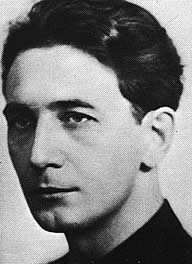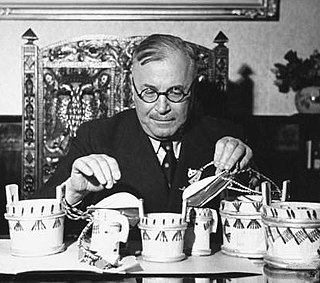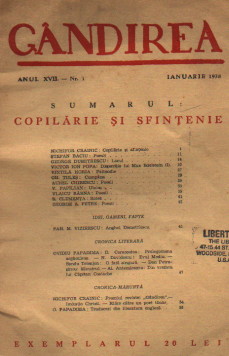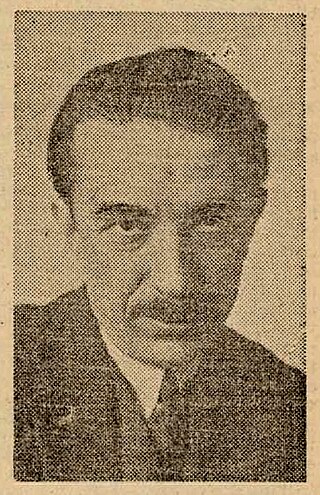
Armand Călinescu was a Romanian economist and politician, who served as 39th Prime Minister from March 1939 until his assassination six months later. He was a staunch opponent of the fascist Iron Guard and may have been the real power behind the throne during the dictatorship of King Carol II. He survived several assassination attempts but was finally killed by members of the Iron Guard with German assistance.

Horia Sima was a Romanian fascist politician, best known as the second and last leader of the fascist paramilitary movement known as the Iron Guard. Sima was also the vice president of the council of ministers and de facto co-leader in Ion Antonescu's National Legionary State. Sima had previously served briefly as State Secretary of Education under Gheorghe Tătărescu in 1940, and as a short-lived Minister of Religion and Arts in the government of Ion Gigurtu.

Tudor Vianu was a Romanian literary critic, art critic, poet, philosopher, academic, and translator. He had a major role on the reception and development of Modernism in Romanian literature and art. He was married to Elena Vianu, herself a literary critic, and was the father of Ion Vianu, a psychiatrist, writer and essayist.

Mihail Sebastian was a Romanian playwright, essayist, journalist and novelist.

Nichifor Crainic was a Romanian writer, editor, philosopher, poet and theologian famed for his traditionalist activities. Crainic was also a professor of theology at the Bucharest Theological Seminary and the Chișinău Faculty of Theology. He was an important racist ideologue, and a far-right politician. He was one of the main Romanian fascist and antisemitic ideologues.

Nae Ionescu was a Romanian philosopher, logician, mathematician, professor, and journalist. Near the end of his career, he became known for his antisemitism and devotion to far right politics, in the years leading up to World War II.

Dimitrie Gusti was a Romanian sociologist, ethnologist, historian, and voluntarist philosopher; a professor at the University of Iaşi and the University of Bucharest, he served as Romania's Minister of Education in 1932–1933. Gusti was elected a member of the Romanian Academy in 1919, and was its president between 1944 and 1946. He was the main contributor to the creation of a new Romanian school of sociology.

The National Legionary State was a totalitarian fascist regime which governed Romania for five months, from 14 September 1940 until its official dissolution on 14 February 1941. The regime was led by General Ion Antonescu in partnership with the Iron Guard, the Romanian ultra-nationalist, anti-Semitic, and anti-communist organization. Though the Iron Guard had been in the Romanian Government since 28 June 1940, on 14 September it achieved dominance, leading to the proclamation of the National Legionary State.

Visarion Puiu was a metropolitan bishop of the Romanian Orthodox Church. During World War II, at a time when Romania was an ally of Nazi Germany, he served as the leading Eastern Orthodox clergyman in occupied Transnistria, a territory where several hundred thousand Jews were murdered. In August 1944, when Romania switched sides, he took refuge in Nazi Germany.

Gândirea, known during its early years as Gândirea Literară - Artistică - Socială, was a Romanian literary, political and art magazine.
Ion Sân-Giorgiu was a Romanian modernist poet, dramatist, essayist, literary and art critic, also known as a journalist, academic, and fascist politician. He was notably the author of works on the Sturm und Drang phenomenon and the influence of Johann Wolfgang von Goethe. During his early years, he was influenced by Expressionism and contributed to the literary magazine Gândirea; he progressively moved towards support for the Iron Guard, edited the far right journal Chemarea Vremii, and spent his last years as a member of Horia Sima's government in exile.

Corpul Muncitoresc Legionar or Corpul Muncitorilor Legionari was a fascist association of workers in Romania, created inside the Iron Guard and having a rigid hierarchical structure. From its creation until September 1940, the CML was led by Gheorghe Clime; afterwards, the position was filled by Dumitru Groza, who oversaw the Corps during the period when the Iron Guard was in power — the National Legionary State —, and involved it in the 1941 Rebellion and Pogrom. The CML had its headquarters in Bucharest, on Calea Călăraşilor.

Oscar Han was a Romanian sculptor and writer.

The relationship between the Romanian Orthodox Church and the Iron Guard was one of ambivalence. The Romanian Orthodox Church promoted its own version of nationalism which highlighted the role of Orthodoxy in preserving the Romanian identity. Starting with the 1920s, the Church became entangled with fascist politics and antisemitism. In this context, the Iron Guard, also known as the Legion of the Archangel Michael, a fascist movement founded in 1927, became very influential with church grassroots. Numerous rank-and-file priests joined the Iron Guard ranks and actively supported its policies; so did a minority of influential high-ranking clergymen such as Nicolae Bălan or Vartolomeu Stănescu.

Dem. Theodorescu was a Romanian journalist, humorist, and critic, remembered for his social-themed novels but also for his controversial political stances. A committed opponent of the National Liberal Party establishment, Theodorescu frequented the avant-garde and socialist circles. During World War I, he transformed himself into a supporter of the Central Powers, and lived the occupation of Romania as a collaborationist. Like his friend Tudor Arghezi, he was imprisoned on a verdict of treason, but pardoned in December 1920.

Mihail Polihroniade was a Romanian historian and journalist.

Prince Alexandru Cantacuzino was a Romanian lawyer and politician, a leading member of the Legionary Movement, and a close collaborator of Legionary leader Corneliu Zelea Codreanu. He notably devised a plot to overthrow Carol II, King of Romania, a plan that would later be taken over by Legionary leader and later Vice President of the Council of Ministers Horia Sima. Cantacuzino was killed on September 22, 1939, at the prison in Râmnicu Sărat, during a retaliation operation ordered by Carol II following the assassination of Prime Minister Armand Călinescu.

Ilie Gârneață was a lawyer and founding member of the Legionary Movement, a far-right movement in Romania.

Gheorghe Clime was a Romanian fascist politician, founding member of the Iron Guard, and president of its electoral wing, Totul pentru Țară.

Buna Vestire was a far-right Romanian newspaper affiliated with, and later published by, the Iron Guard.

















